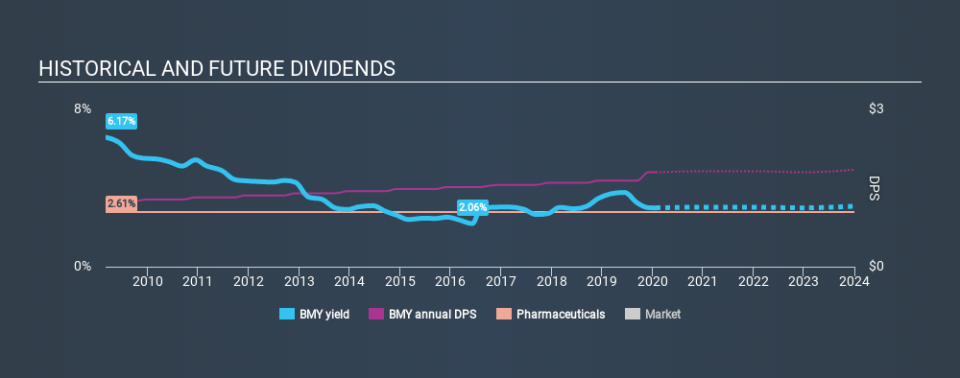Are You An Income Investor? Don't Miss Out On Bristol-Myers Squibb Company (NYSE:BMY)

Dividend paying stocks like Bristol-Myers Squibb Company (NYSE:BMY) tend to be popular with investors, and for good reason - some research suggests a significant amount of all stock market returns come from reinvested dividends. If you are hoping to live on the income from dividends, it's important to be a lot more stringent with your investments than the average punter.
A 2.8% yield is nothing to get excited about, but investors probably think the long payment history suggests Bristol-Myers Squibb has some staying power. Some simple analysis can offer a lot of insights when buying a company for its dividend, and we'll go through this below.
Click the interactive chart for our full dividend analysis
Payout ratios
Companies (usually) pay dividends out of their earnings. If a company is paying more than it earns, the dividend might have to be cut. So we need to form a view on if a company's dividend is sustainable, relative to its net profit after tax. Looking at the data, we can see that 47% of Bristol-Myers Squibb's profits were paid out as dividends in the last 12 months. This is a medium payout level that leaves enough capital in the business to fund opportunities that might arise, while also rewarding shareholders. Besides, if reinvestment opportunities dry up, the company has room to increase the dividend.
Another important check we do is to see if the free cash flow generated is sufficient to pay the dividend. Bristol-Myers Squibb paid out a conservative 35% of its free cash flow as dividends last year. It's positive to see that Bristol-Myers Squibb's dividend is covered by both profits and cash flow, since this is generally a sign that the dividend is sustainable, and a lower payout ratio usually suggests a greater margin of safety before the dividend gets cut.
While the above analysis focuses on dividends relative to a company's earnings, we do note Bristol-Myers Squibb's strong net cash position, which will let it pay larger dividends for a time, should it choose.
Consider getting our latest analysis on Bristol-Myers Squibb's financial position here.
Dividend Volatility
From the perspective of an income investor who wants to earn dividends for many years, there is not much point buying a stock if its dividend is regularly cut or is not reliable. Bristol-Myers Squibb has been paying dividends for a long time, but for the purpose of this analysis, we only examine the past 10 years of payments. The dividend has been stable over the past 10 years, which is great. We think this could suggest some resilience to the business and its dividends. During the past ten-year period, the first annual payment was US$1.24 in 2010, compared to US$1.80 last year. Dividends per share have grown at approximately 3.8% per year over this time.
Dividends have grown relatively slowly, which is not great, but some investors may value the relative consistency of the dividend.
Dividend Growth Potential
While dividend payments have been relatively reliable, it would also be nice if earnings per share (EPS) were growing, as this is essential to maintaining the dividend's purchasing power over the long term. Strong earnings per share (EPS) growth might encourage our interest in the company despite fluctuating dividends, which is why it's great to see Bristol-Myers Squibb has grown its earnings per share at 17% per annum over the past five years. Earnings per share have been growing at a good rate, and the company is paying less than half its earnings as dividends. We generally think this is an attractive combination, as it permits further reinvestment in the business.
Conclusion
Dividend investors should always want to know if a) a company's dividends are affordable, b) if there is a track record of consistent payments, and c) if the dividend is capable of growing. It's great to see that Bristol-Myers Squibb is paying out a low percentage of its earnings and cash flow. That said, we were glad to see it growing earnings and paying a fairly consistent dividend. All these things considered, we think this organisation has a lot going for it from a dividend perspective.
Earnings growth generally bodes well for the future value of company dividend payments. See if the 12 Bristol-Myers Squibb analysts we track are forecasting continued growth with our free report on analyst estimates for the company.
We have also put together a list of global stocks with a market capitalisation above $1bn and yielding more 3%.
If you spot an error that warrants correction, please contact the editor at editorial-team@simplywallst.com. This article by Simply Wall St is general in nature. It does not constitute a recommendation to buy or sell any stock, and does not take account of your objectives, or your financial situation. Simply Wall St has no position in the stocks mentioned.
We aim to bring you long-term focused research analysis driven by fundamental data. Note that our analysis may not factor in the latest price-sensitive company announcements or qualitative material. Thank you for reading.



